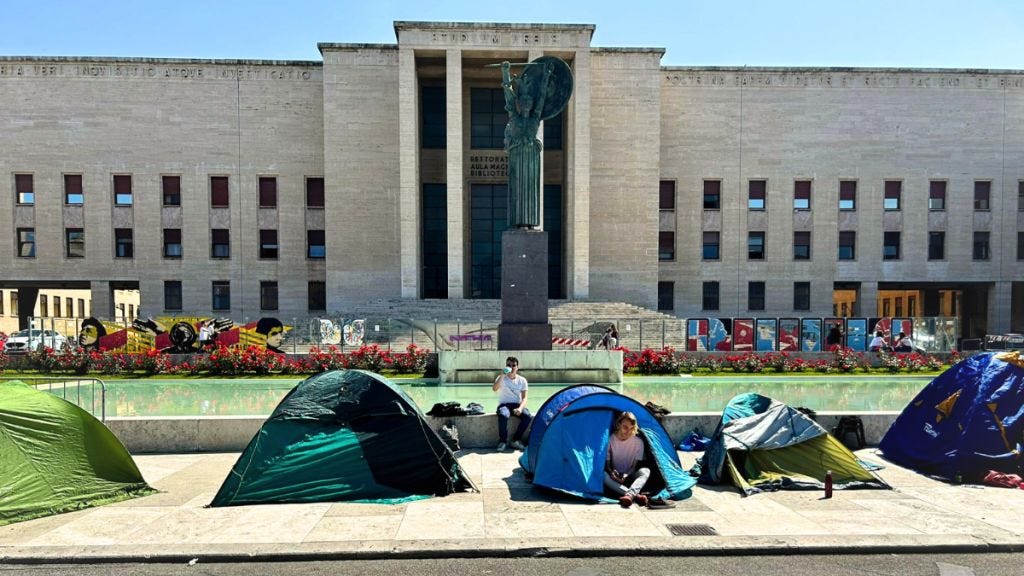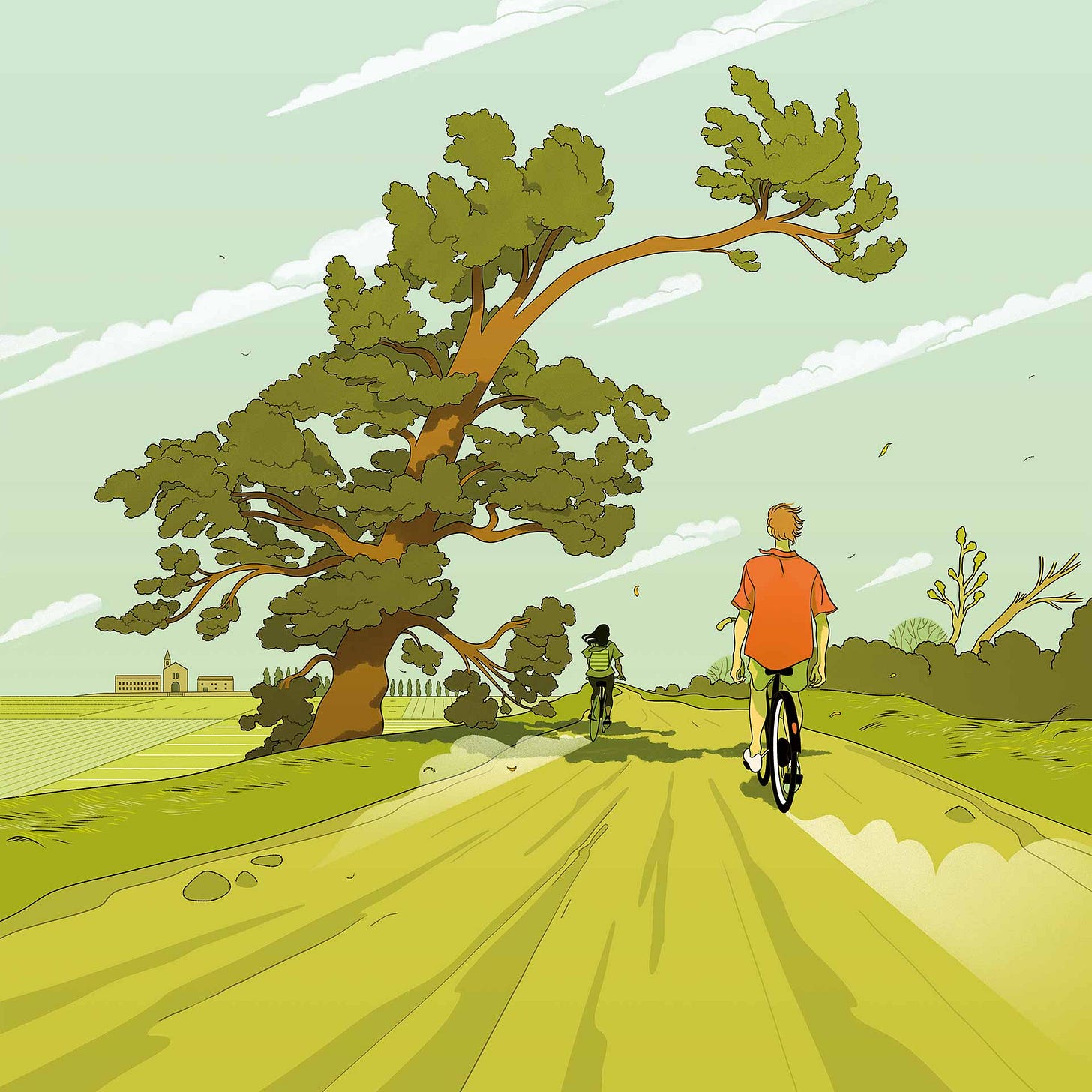I want to dedicate this first story to a friend of mine who is currently on a mission in the central Mediterranean, saving lives on an NGO boat. Let’s call this individual M. I admire M. Trust M. Respect M. M is a friend with a genuine civic spirit, who’s accumulated experience assisting in many emergency scenarios over the years from the Aquila earthquake to Covid-19. Of course, when M told me he was heading out on this particular mission I was concerned. We’ve been in touch, on and off, on whatsapp during his time on board - both for professional and personal reasons. Last week, I got an alert. “Check social media” he said. So I did. That’s how I found that the boat he is on, the SOS Humanity, has just rescued 88 people from almost certain death in the sea. In real-time I followed the next steps on Facebook, in fragments. There was minimal media coverage. For four long days, I followed the boat’s journey to Livorno, many miles north (due to Italian government policy) to unload the survivors. M shared a few anecdotes with me; too personal to recount here. But I still wanted to highlight this rescue - in these terms - as a personal reminder of the ongoing border crisis in the Central Mediterranean, of the risks that NGOs are taking to save lives, and the humanity that is at stake in all of this. Headlines come and go, but the emergency is by no means over. In fact, according to OHCHR, refugee arrivals are four times higher than last year. In other words, quite frankly: even as Meloni’s government tightens up asylum rules, and proclaims it is “taking action”, the real situation is actually deteriorating. To find out more, and to support the rescue efforts, click here.
This week the Government unveiled a draft for a new piece of legislation which is designed to tackle the relatively modest problem of over-tourism in Italy. The new provisional DDL outlines a few measures which, according to the current administration, will solve the issue once and for all. According to the text the state is planning to introduce a new categorisation system, and standard code, for all types of short term lets; a new fine of 10.000 euro for irregular conduct; and a new two night minimum threshold for stays in particularly crowded areas. As you might guess, many have voiced criticism. I myself wonder why the proposals are so timid, why there are no stricter controls, no investment commitments, no talk of rights at a time when students are literally sleeping in tents outside their universities due to the cost of living crisis. The best analysis, I’ve seen, however, goes to Antonio Corliano from the protest movement Cambiare Rotta. In his words: “[the government] doesn’t say anything about regulating the rental market. And tourist rentals are just the tip of the iceberg. At the core is the problem of property speculation, a lack of public investment, the absence of any concrete structural plan to support groups like students”. Indeed. For more details on this lacklustre draft, and a roster of similar responses, check out this feature in L’Espresso [ITA only I’m afraid].
Enzo Traverso, the Italian historian and author, gave a brilliant interview to the radical left Dinamo Press this week about the current collapse of democracy at a global level. In the exchange with the journalist Ilya Budraitskis, Traverso covers a wide terrain, looking at important and poorly understood similarities and differences between Mussolini and Hitler’s regimes and those of today’s ultra conservatives. Traverso also captures some important (geo)political nuances: situating, for example, how the agenda of Meloni and co differs from that of, say, Putin or Bolsonaro and, even more contentiously (for some) makes a case as to why Western nations should, yes, send arms to Ukraine, but without upping military spending. The link below is Italian only - but I imagine it also works in google translate / deepl if you’re interested. So here’s my own version of a favourite passage, just to give a flavour. Click here for the full analysis.
Classical fascism really carried a powerful utopian charge … associated with a fundamentally different understanding of the meaning of life. They had very ambitious ideas: their myth about the “new man”, about the “millennial Reich” and so on. This utopian dimension of fascism was a response to the deepening crisis of European and global capitalism. And today all this does not exist, precisely because neoliberal capitalism presents itself as a completely unchallenged and invincible system… - Enzo Traverso 2023
Arts and culture: il brutto paese?
What can I say? I’m an unashamed fan of the Po valley. Yes, I know, it’s “ugly”. Bits of it are numbingly flat, bits of it are industrial, bits of it are blighted by floods, droughts, landslides. Nevertheless, that distinctive, utilitarian once malarial agricultural plain has a special place in my heart. I’ve been tied to the area ever since I was a kid, when I used to visit a friend’s much loved and now deceased grandparent summer after summer after summer. I‘ve got fond memories of the august heat-shimmer, the cicadas, the sagre, the warmth of the people, not to mention my first ever coniglio alla cacciatora served from a terracotta pot. Having since explored the entire peninsula - north to south - I still think the place is special. This is precisely why I want to give a little publicity to a new art initiative which is trying valiantly to reinvent the Po area as a (minor) tourist destination. Un altro po is an illustration-tourism project which aims to valorize the hidden beauties of this usually overlooked hinterland via depictions, and maps, of cycling trails. The images themselves, by a whole range of artists, are beautiful and well-capture the languorous atmospherics of what it’s like to explore the place on two wheels. Click here to scroll through a few screenshots and open your mind to the beauties of some of the lesser known and apparently “ugly” parts of this actually rather beautiful countryside.
Motta, Tuscany’s oddball indie heart-throb, has got a new track out this week called anime perse (lost souls) which is well worth a listen. Now, I’m quite a fan of Motta so I’ve been looking forward to this one for a while. That said, in all honesty, I have to admit, at first, I was disappointed. The intro, the first minute-or-so, with its low-key piano, is a little flat; a little impotent. The moody chorus, however, more than makes up for it. Trust me. Like any good indie track this one builds and builds over time into a wall of distorted guitar sound, and a little subtle lift of 80s synth - vaguely reminiscent of sail awolnation - that, for me, really works. Yes, the lyrics are cheesy, but they do the job. The romantic spirit is bold and uninhibited. All in all, this a strong release and a good reminder that Italian contemporary-alternative music still has something going for it - whatever the naysayers might think. Motta, if it was ever in doubt, is still a key player. Listen below, with eyes closed, volume up and headphones firmly in place.
Recipe: spaghetti con le cozze
Katie Parla’s latest book ‘Food of the Italian Islands’ is, and was always going to be, one of my books of the year. I’m a big fan of Parla’s, as I’ve written here many times. I appreciate her irreverence, her meticulous research, her political and social awareness about food, the economy of food, the consumption of food. Of all the many anglophone Italophile culinary peddlers out there, she absolutely deserves her reputation as an authority on the ‘real’ cuisine. There’s a lot of stuff you’re going to want to cook in this collection - dishes from Sicily, Sardinia, Ponza and beyond - but one of most intriguing, to my mind, is her straightforward mussel pasta. No fuss about it. Seafood, garlic, tomato, parsley, wine and spaghettoni. What more do you need? And what better way to start the summer in earnest? Here’s the link.
About Me
My name is Jamie Mackay (@JacMackay) and I’m an author, editor and translator based in Florence. I’ve been writing about Italy for a decade for international media including The Guardian, The Economist, Frieze, and Art Review. I launched ‘The Week in Italy’ to share a more direct and regular overview of the debates and dilemmas, innovations and crises that sometimes pass under the radar of our overcrowded news feeds.
If you enjoyed this newsletter I hope you’ll consider becoming a supporter for EUR 5.00 per month (the price of a weekly catch-up over an espresso). Alternatively, if you’d like to send a one-off something, you can do so via PayPal using this link. No worries if you can’t chip-in or don’t feel like doing so, but please do consider forwarding this to a friend or two. It’s a big help!






